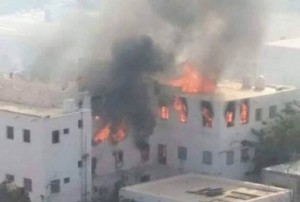Early this morning, jihadists with al Qaeda in the Arabian Peninsula (AQAP) stormed a prison in Mukallah, an important coastal city and capital of Hadramout province in southeastern Yemen. AQAP fighters reportedly freed 300 inmates from the Central Prison, including a known AQAP leader named Khaled al-Batarfi.
Attackers stormed the prison from several directions, battling with prison guards and reportedly killing two and wounding others. Following the clashes with Yemeni prison guards, which facilitated the escape of 300 inmates, AQAP staged a coordinated attack on a number of military and government targets in the city. The assaults targeted Hadramout province’s security headquarters, the local police station, the Hadramout province administrative offices, and a branch of the central bank, among other locations. The Yemeni state media outlet, Saba, reported that security forces managed to repel an AQAP attempt to raid several banks and money exchange centers.
Other Arabic media outlets reported that AQAP fighters also attacked the Republican Palace and staged several ambushes in various sections of the city. Some jihadists were reportedly killed during the course of this prolonged operation, although media sources across the region are unable to confirm an exact figure.
Later in the day, reports out of Yemen suggested that AQAP had not withdrawn from Mukallah. Rather, it appears that the terrorist organization is spreading throughout the city, and is even besieging military forces at the port area.
Khaled al-Batarfi, who was allegedly freed today along with the other 300 inmates at the Central Prison, was arrested by Yemeni authorities in March 2011. Batarfi was described at that time as a “leader and media official for al-Qaeda,” and Yemeni authorities deemed him “one of the most dangerous al-Qaeda leaders.” Batarfi was reportedly responsible for AQAP’s military operations in Abyan and Baydha provinces, as well as commanding AQAP’s media communications. At the time of his arrest, he was caught with explosive material, a computer, and automatic weapons.
Today’s attack comes against the backdrop of an ongoing six-month long coup taking place in the country. Shiite Houthi rebels, hailing from the country’s northern provinces, seized the Yemeni capital of Sana’a in late September, and then continued their military expansion throughout the country. The rebels held much of the Yemeni government under house arrest in the capital, and forced the Yemeni president, Abd Rabbo Mansour Hadi, to tender his resignation. Hadi eventually fled the city for the port city of Aden, and subsequently slipped out of the country.
Last week, Saudi Arabia and nine other Arab countries launched a military campaign in Yemen in a bid to re-instate the president and dislodge the Houthi rebels from their positions. Today’s attack in Mukallah comes amid reports that the Arab coalition managed to push back the Houthi rebels from Aden. Reports later in the day countered that the rebels successfully took control of an important central district in Aden, including the presidential palace in the city.
Today’s prison break is by no means AQAP’s first. Rather, this appears to be a tried and tested tactic that the terrorist organization employs, specifically when political upheaval has created a power vacuum in Yemen. Last February, when the Houthi rebels now controlling the country were beginning to consolidate control in northern provinces, AQAP freed several of its operatives from the central prison in Sana’a in a complex assault that involved suicide bombers and an assault team. Nineteen AQAP operatives were freed during that operation. Indeed, several of AQAP’s leaders, including its current emir, Nasir al-Wuhayshi, escaped from the Central Prison in Sana’a in February 2006 in an operation which breathed new life into the al-Qaeda organization in Yemen.









3 Comments
Interesting, further proof America and its Allies don’t know how to win wars anymore and falls back on calling successful militant groups terrorists which is undefinable and useless because any definition by definition also extends to nation states.
Lets call these groups militants. Once we do, then we can recognize what we are really fighting for and if it is worth it. If it isn’t worth it, we pull the plug like we did in Vietnam and don’t look back.
If it is worth it, then we initiate a draft so every American has skin in the game and go all in. Otherwise again, we pull out and don’t look back because the American people don’t want to pay the price just so Corporations can have an economic colony they care shit about.
great news, always pleased to read combatants entering the affray other than US Military Personnel. Its also most welcome to read a ‘personality’ of consequence reentering the ‘mix.’
So this also begs the question just how thinly spread can Iranian Forces get? Now that Iran appears to be on the ‘Front End’ of a development involving fighting on 2 Fronts, I guess one could possibly make the case Iran will actually be Fighting on 3 Fronts seein how there is no stable/secure land corridor connecting Iraq & Syria, ‘we’ should get a good ‘look’ at Iranian support/logistical capabilities. This just keeps better & better
Let’s make up a euphemism for terrorists and call them militants.
that will work as well as calling retarded people, mentally challenged.
In this day an age the transferrance of connotation may take 1 news cycle.
Tom, who do you think you are fooling. At this point in time you maybe fooling only with yourself.